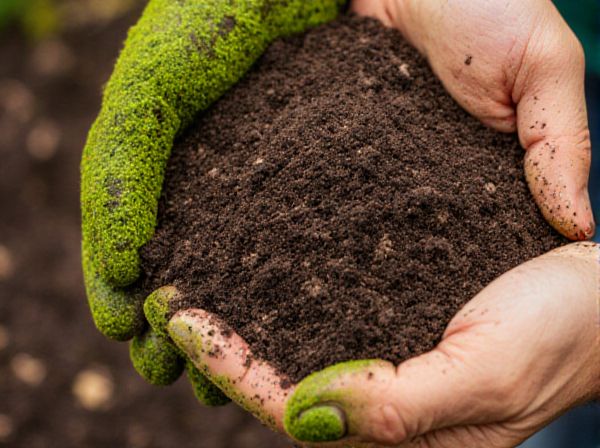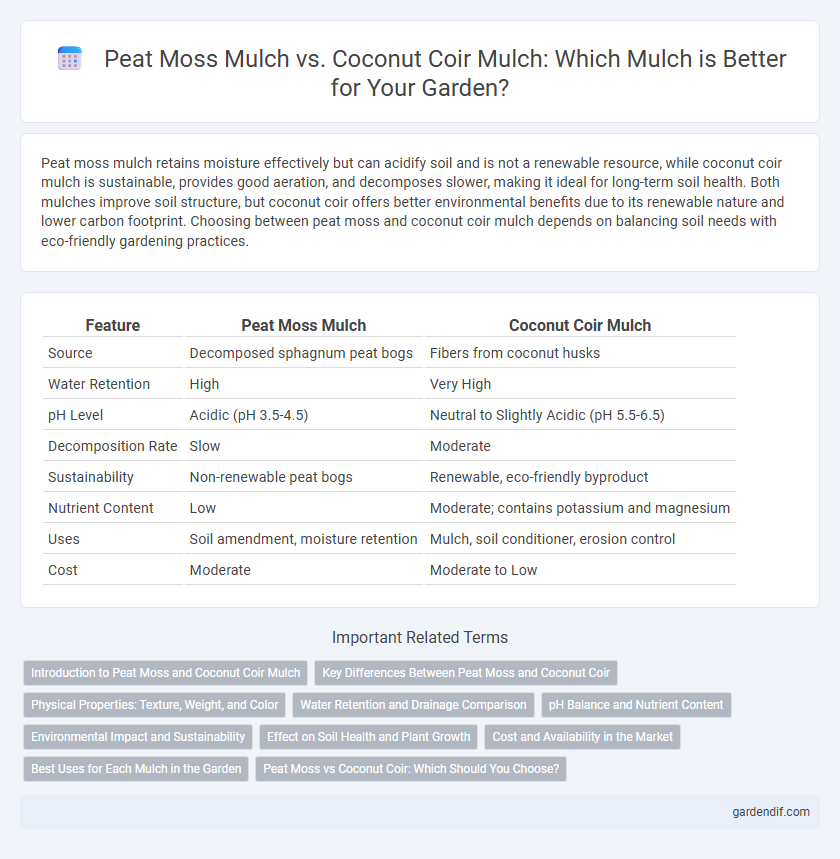
Peat Moss Mulch vs Coconut Coir Mulch Illustration
Peat moss mulch retains moisture effectively but can acidify soil and is not a renewable resource, while coconut coir mulch is sustainable, provides good aeration, and decomposes slower, making it ideal for long-term soil health. Both mulches improve soil structure, but coconut coir offers better environmental benefits due to its renewable nature and lower carbon footprint. Choosing between peat moss and coconut coir mulch depends on balancing soil needs with eco-friendly gardening practices.
Table of Comparison
| Feature | Peat Moss Mulch | Coconut Coir Mulch |
|---|---|---|
| Source | Decomposed sphagnum peat bogs | Fibers from coconut husks |
| Water Retention | High | Very High |
| pH Level | Acidic (pH 3.5-4.5) | Neutral to Slightly Acidic (pH 5.5-6.5) |
| Decomposition Rate | Slow | Moderate |
| Sustainability | Non-renewable peat bogs | Renewable, eco-friendly byproduct |
| Nutrient Content | Low | Moderate; contains potassium and magnesium |
| Uses | Soil amendment, moisture retention | Mulch, soil conditioner, erosion control |
| Cost | Moderate | Moderate to Low |
Introduction to Peat Moss and Coconut Coir Mulch
Peat moss mulch, derived from partially decomposed sphagnum moss found in bogs, retains moisture effectively and acidifies soil, making it ideal for acid-loving plants. Coconut coir mulch, made from the fibrous husks of coconut shells, offers excellent aeration and water retention while being a sustainable, renewable resource. Both mulches improve soil structure but vary in pH impact and environmental footprint, influencing their selection in gardening.
Key Differences Between Peat Moss and Coconut Coir
Peat moss mulch retains moisture effectively but has a low pH, making it slightly acidic, while coconut coir mulch is more neutral with superior water retention and aeration properties. Peat moss is a non-renewable resource with environmental concerns, whereas coconut coir is a sustainable byproduct of coconut processing. Both mulches improve soil structure, yet coconut coir decomposes slower, providing longer-lasting benefits in garden beds.
Physical Properties: Texture, Weight, and Color
Peat moss mulch features a fine, lightweight texture with a dark brown to black color, making it ideal for moisture retention and soil aeration. Coconut coir mulch exhibits a coarser, fibrous texture, is heavier, and presents a tan to reddish-brown hue, enhancing durability and resistance to decomposition. The physical properties of each mulch type influence water retention, soil temperature regulation, and aesthetic appeal in garden landscapes.
Water Retention and Drainage Comparison
Peat moss mulch excels in water retention due to its high absorbency, making it ideal for moisture-loving plants, but it can cause poor drainage if overused. Coconut coir mulch offers a balanced combination of water retention and improved drainage, allowing excess water to flow through while keeping soil moist. This makes coconut coir mulch preferable for gardens needing better aeration and less risk of root rot compared to peat moss mulch.
pH Balance and Nutrient Content
Peat moss mulch typically has an acidic pH ranging from 3.5 to 4.5, making it ideal for acid-loving plants but potentially requiring pH adjustment for neutral or alkaline soil preferences. Coconut coir mulch maintains a near-neutral pH between 5.5 and 6.8, suitable for a wider variety of plants and less likely to alter soil pH drastically. In terms of nutrient content, peat moss contains fewer nutrients and mainly improves soil structure, while coconut coir offers better retention of nutrients like potassium and magnesium, enhancing soil fertility.
Environmental Impact and Sustainability
Peat moss mulch, derived from decomposed sphagnum moss in peat bogs, has significant environmental drawbacks due to the destruction of sensitive wetland ecosystems and the release of stored carbon dioxide, contributing to climate change. Coconut coir mulch, sourced from the fibrous husks of coconuts, offers a more sustainable alternative with its renewable nature, biodegradability, and lower carbon footprint, as it utilizes a byproduct of the coconut industry instead of depleting natural wetlands. Choosing coconut coir mulch supports sustainable gardening practices by promoting resource conservation and reducing harmful greenhouse gas emissions.
Effect on Soil Health and Plant Growth
Peat moss mulch improves soil acidity and moisture retention, making it ideal for acid-loving plants, but its slow decomposition can limit nutrient availability over time. Coconut coir mulch enhances soil aeration and drainage, promoting beneficial microbial activity and sustained nutrient release that supports vigorous plant growth. Both mulches improve soil structure, but coconut coir offers a more sustainable option with balanced pH and increased organic matter turnover.
Cost and Availability in the Market
Peat moss mulch generally costs more due to its harvesting challenges and limited sustainable supply, while coconut coir mulch is often more affordable and widely available because it is a byproduct of the coconut industry. Coconut coir mulch benefits from a consistent supply chain, especially in tropical regions, making it accessible in many garden centers and online retailers. Peat moss availability is declining as environmental concerns limit peat harvesting, impacting both price and market presence.
Best Uses for Each Mulch in the Garden
Peat moss mulch excels in retaining moisture and suppressing weeds, making it ideal for acid-loving plants like blueberries and azaleas. Coconut coir mulch offers superior water retention and aeration, perfect for vegetable gardens and container plants requiring well-drained soil. Both mulches improve soil structure but choosing the right one depends on specific plant needs and environmental sustainability preferences.
Peat Moss vs Coconut Coir: Which Should You Choose?
Peat moss mulch offers excellent water retention and nutrient-holding capacity, making it ideal for acidic soil plants, while coconut coir mulch provides superior aeration and is a sustainable, renewable resource with a neutral pH suitable for a wide range of garden applications. Peat moss's slow decomposition enhances long-term soil structure, whereas coconut coir mulch breaks down faster but improves soil drainage and reduces compaction. Choosing between peat moss and coconut coir mulch depends on soil type, plant requirements, and environmental considerations, with coconut coir favored for eco-friendly gardening.
Peat Moss Mulch vs Coconut Coir Mulch Infographic

 gardendif.com
gardendif.com